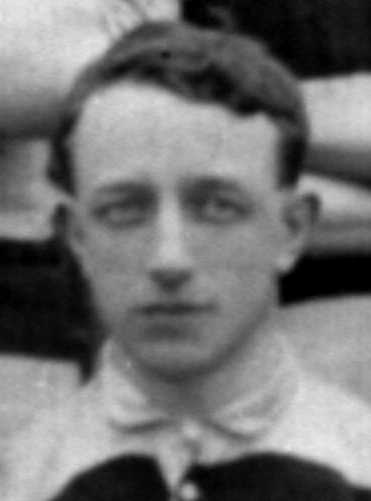
Mr Rugby Union in Lancashire
Walter Bernard Croxford
Written and researched by David Bohl, with the kind help of internet historians worldwide.
W.B.Croxford was born in Camden Town, London around 1883 and was educated and trained in the game of rugby union at St Chad's College, Denstone, Staffordshire. He played for Lancashire as a wing three-quarter just before the First World War.

He came to Liverpool to take up a teaching post and joined the Aliens Rugby Club based in Clubmoor where he became Captain in the 1912-13 season.
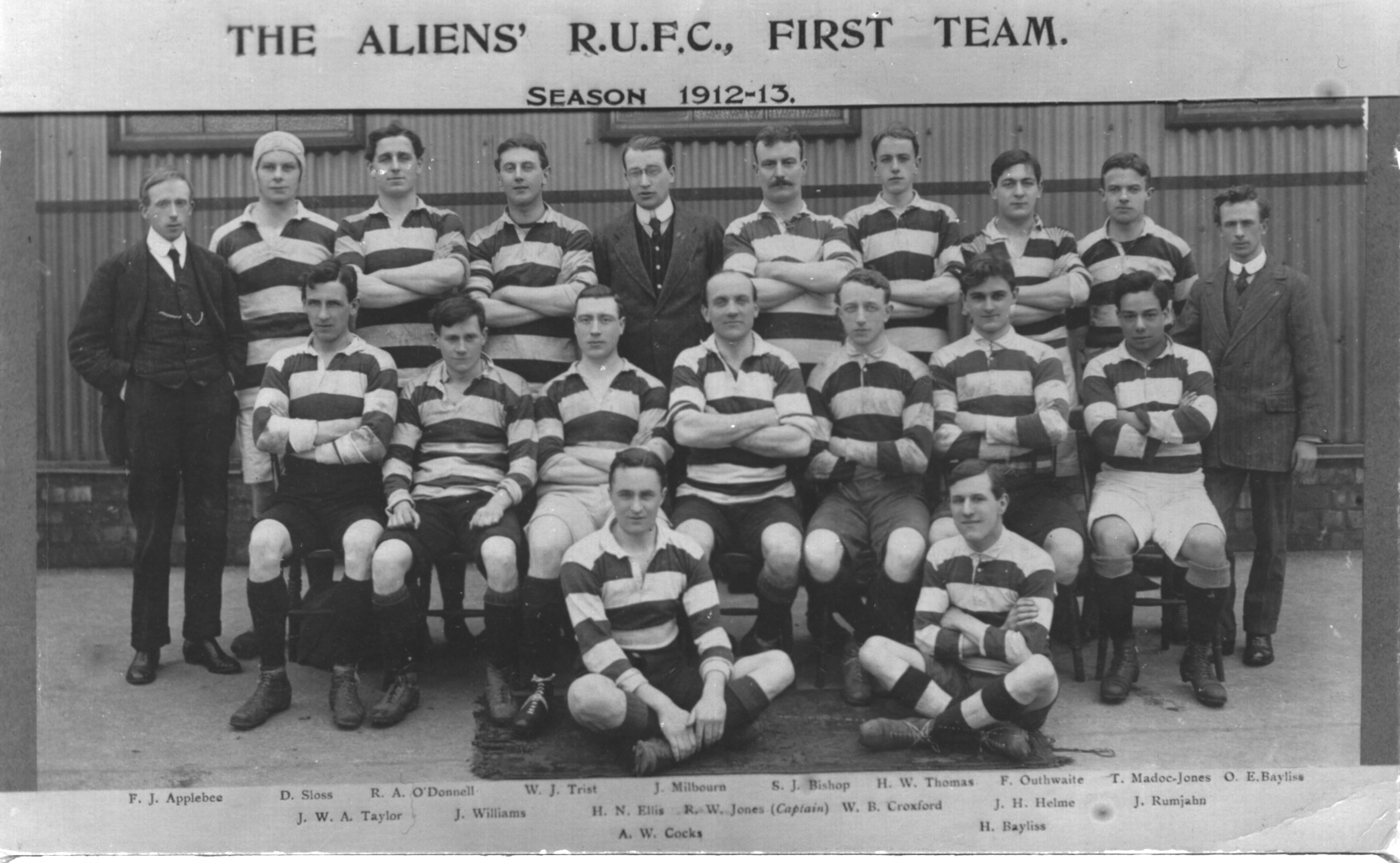
Career Before Moving to Liverpool
Local newspaper reports in June 1902 reveal Croxford was playing cricket at Newton Abbott Grammar School in Devon, a pupil teacher centre at the time.
By 1904 he had moved to Manchester and with the demise of the Manchester Athletic Club rugby team in Fallowfield he started to play for the up and coming club Heaton Moor.
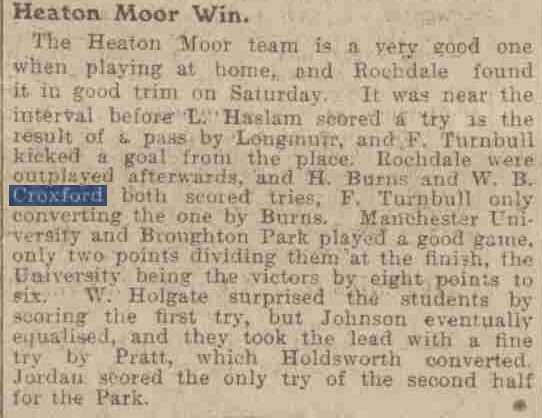 |
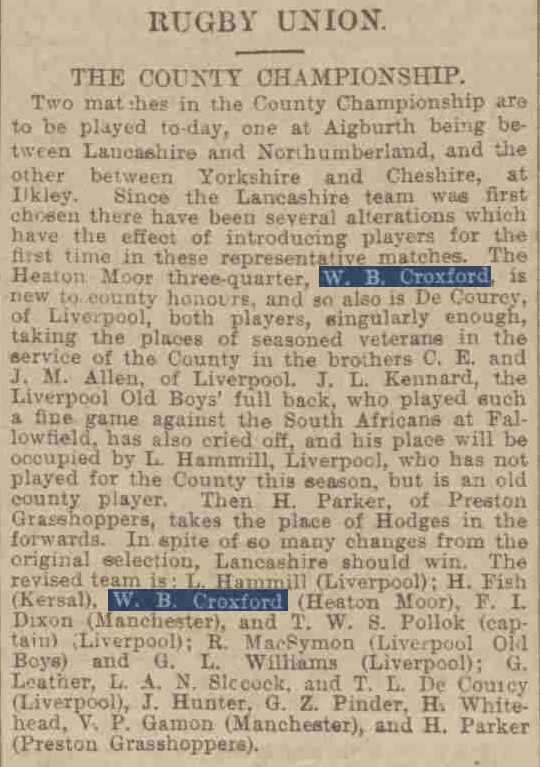 |
|
Lancashire
Evening Post
29th Jan 1906
|
Lancashire
Evening Post
19th Jan 1907
|
During 1905-06 he turned out on a regular basis under the captaincy of H.S.Johnson who became President of Lancashire County R.F.U. from 1928-30.
Throughout
1907-09 his playing skills were rewarded with many representative games
for Lancashire, Moor being honoured with the hosting the 1908 County
fixture between Lancashire and Cumberland.
Kersal RFC historians document that "games were recorded in the North East against Durham City, Novocastrians, Hartlepool Rovers and West Hartlepool. In the West Country there were games against Stroud, Bristol Saracens, Bridgewater, Taunton, Newton Abbott, Torquay Athletic and Bath. The latter fixture was recorded for posterity with a team photograph in 1908. Players who represented their counties and also played for Kersal whilst on tour included: W.Dodds, C.Dodds, R.Stewart, R.B.J.Heads (Northumberland and North of England.) Others were: S.Walton-Brown, N.R.C.Wilkinson, R.Gibson, W.B.Croxford, J.Bainbridge (Heaton Moor and Lancashire). "
Rugby Career in Liverpool
CROXFORD TROUBLES ECCLES.
It was a great loss to Heaton Moor when Croxford left them to join the Aliens, and the Liverpool side have benefited greatly. He was a great cause of uneasiness to the Eccles defenders at Barton, but they managed to baulk his scoring opportunities, and the Manchester team won by the narrow margin of a try. The Eccles forwards worked keenly throughout and just managed to turn the verdict in favour of their side. Bowker scored two of the tries and if it should happen-as most people think probable-that the rearranged pack fail against Yorkshire the Selection Committee might well call again on Bowker. He was one of the best forwards in the trial match and did far more work, though perhaps less shouting, than some those who were chosen.
Daily Mail 12/11/1912
Report for season 1912-13 by Secretary F.J.Applebee
The first team played 24 matches, 9 of which were won, 3 drawn and 12 lost. They scored 221 points against 281 by their opponents. The chief scorers were W.B.Croxford 14 tries, W.J.Trist 11 tries and R.W.Jones 7 tries.
Croxford keeps the game of Rugby alive on Merseyside during the Great War
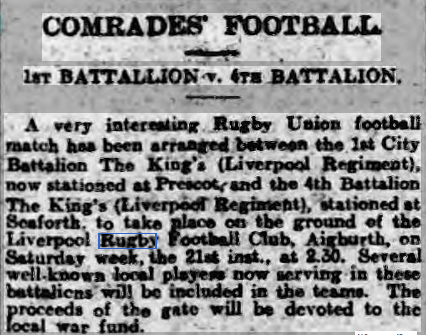 |
|
|
|
Liverpool
Daily Post Nov 10th 1914
|
Liverpool
Echo Jan 27th 1916
|
Liverpool
Echo Feb 2nd 1916
|
|
|
|
|
|
Liverpool
Echo Mar 1st 1916
|
Liverpool
Echo Dec 8th 1916
|
Liverpool
Echo Jan 12th 1917
|
|
|
||
|
Liverpool
Echo Jan 24th 1917
|
Service in WW1
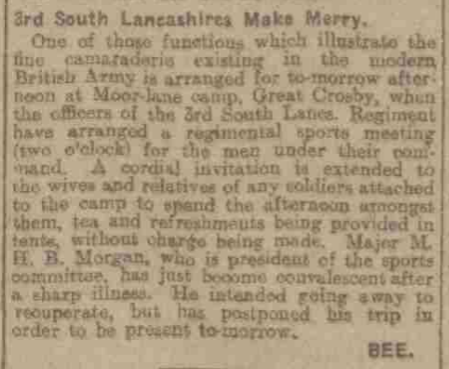
CROXFORD PRAISE.
The Aliens- surely it is time a more appropriate name was found for this club, put up a good fight with fourteen men at Heaton Moor, in a match in which W.B.Croxford played at stand-off half- back, and scored his side's only try. As a member of the Lancashire County Committee, and also of the Selection Committee and the Schools' Sub-Committee, Mr. Croxford has done valuable service for the football of the county in the last twelve months of reconstruction. At a time when a keen organiser was needed to revive the game in Liverpool, Mr. Croxford worked with tremendous earnestness and the fact that Merseyside Rugger revived so splendidly is due in a large measure to his untiring efforts. One thought his playing days were over, but, having done everything that was possible for one man to do as an organiser and in the committee-room, he apparently needed an outlet for still more energy. Mr. Croxford and Mr. Edgar Craig, of Broughton Park, have made a great effort to do for Lancashire what Mr. R. F. Oakes has done for Yorkshire. (1920)
Sefton’s Up-hill Task
The fine spirit which the Rugby game encourages is well illustrated in the case of the Sefton club. Rugger is played in very primitive conditions at West Derby, and has but meagre support from the district, though there is nothing to pay, and all are welcome. Yet Sefton can run four teams, and has a playing membership of a hundred or so keen young enthusiasts.
The club owes much to the untiring work for the game of W.B.Croxford who took the lead in reorganising Liverpool Rugger after the armistice was signed, and who has had a couple of seasons of arduous work as a member of the Lancashire County Selection Committee. With more freedom this term, he is taking a hand in the game again, and his experience must be very valuable to a young side that has learnt not to be discouraged by defeat. A strong feature of Sefton football is the loyalty of the players to their club. Such loyalty merits better fortune.
Liverpool Daily Post 20/9/1922
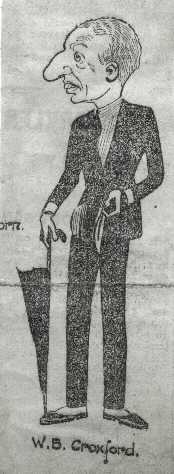
[Sefton Committee annoyed that their ground was described as "primitive"]
Sefton's improvement
One of the best achievements in Merseyside Rugger last week-end was the victory of Sefton on the new ground of the Old Salfordians, for the Salfordians have built up a great reputation for home victories during the past two seasons. Though they were without the assistance of S. Brown, who was playing for his own club, St. Helen’s Old Boys, Sefton were able to include in their pack Laker, formerly of Sunderland and the Old Whitgiftians, and the forwards played a capital game against their heavier opponents, while the backs utilised their opportunities very smartly, Norman Hutchings being in especially good form.
There has been some little misapprehension as to the reference to the Sefton club’s ground at West Derby as "primitive." The playing piece is well enough, and big enough, but it is a field among fields with no appointments save the goal posts and touch flags. The allusion to primitive conditions was made with the idea of showing how admirable the sporting spirit of the members is in face of difficulties.
Liverpool Daily Post 27/9/1922
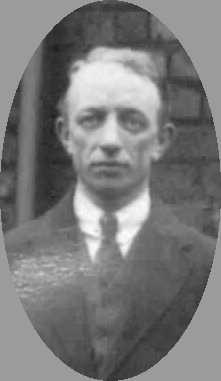
President 1928-30
RUGBY REVIEWED
in the Liverpool Echo
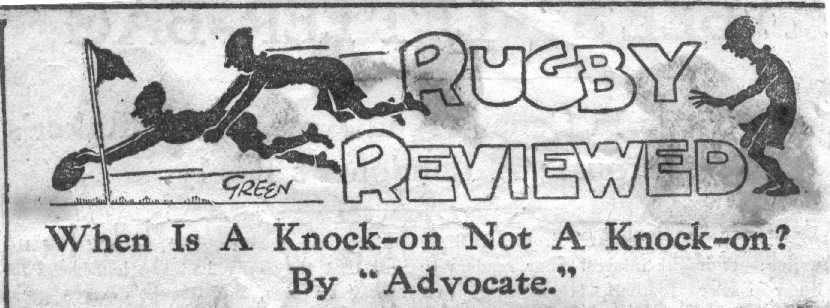
When Is A Knock-on Not A Knock on ?
By "Advocate."
A club official of long experience, who has done a considerable amount of refereeing and who is a very critical observer of differences in interpretation of rules, has asked me to put forward a plea for the establishment of a more definite ruling as to what constitutes a "knock-on.’’ In the laws of the game, part 1, law 2, the following appears: "Knock-on or throw forward is the propulsion of the ball by hand or arm of a player in the direction of his opponents' dead ball line," and in a later place, "A rebound is not a knock-on." In Notes for Referees, 1927-28, the London Referees' Society has the following instruction, "A slight fumble by the player in catching the ball must not be considered a knock-on, provided he does not lose control of it."
The club official who had raised the question contends that there is such wide difference in the opinion of referees as to what does or does not constitute a knock-on that it would be better if the controlling official was deprived of the onus of judgement in this matter by the definite ruling, either that the ball must be taken cleanly at the first attempt, or that the game should be allowed to proceed as long as the player who fumbles is able to gather the ball before it touches the ground. Each of the three alternatives has its own peculiar advantages. To keep to the literal interpretation of the definition is to impress upon the player the necessity for sure handling, and put a premium upon clean passing and gathering of the ball. To give further licence by allowing the ball to be gathered after being propelled well forward would reduce the number of checks and speed up the game to some extent. The intermediate course would be ideal were it not that it depends on simple sounding terms which are by no means easy to define. What is "a slight fumble ? When does a player lose control of the ball ?" Some will say that control is lost when the ball is no longer gripped by the hands, others will contend that the fact that a player ultimately gathers the ball is sufficient evidence of control even in the absence of contact with any part of the body.
If all referees were of the standard set in representative and senior club games, there would be a very strong case for the retention of the "slight fumble," or "under control" definition. Unfortunately they are not, and young players experience such varying decisions in successive weeks that they are left in a state of bewilderment. To the other two alternatives there are distinct drawbacks which cannot be overlooked. Very few passes, particularly in bad weather, are taken so cleanly at the first attempt that the hypercritical could not find some slight fault with them. The all allowed definition would probably increase the slovenliness in handling already much too common in many quarters, and would tend to increase carelessness, not only in the taking, but in the giving of passes. The knock-on, and the advantage rule, which I shall discuss next week, are matters which might well be given consideration by various referees' societies. It would, I feel, be a good thing for the control of the game, if the societies introduced two types of membership- ordinary, for those taking club games under the society's instructions, and associate, those taking second and third team games on request of their clubs, the latter not coming under the society's call, but having the right to receive all publications and circulars, and to be present at meetings, with or without, as might be found advisable, the right to vote.
("Advocate" was none other than W.B.Croxford)
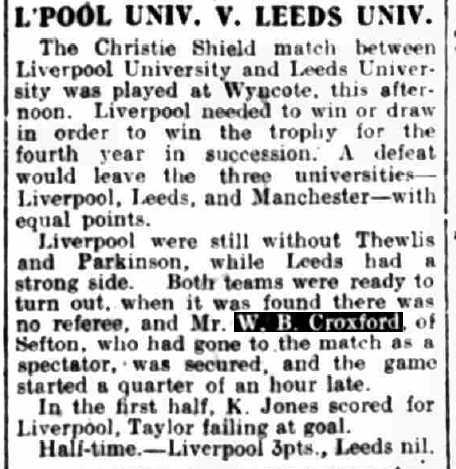
|
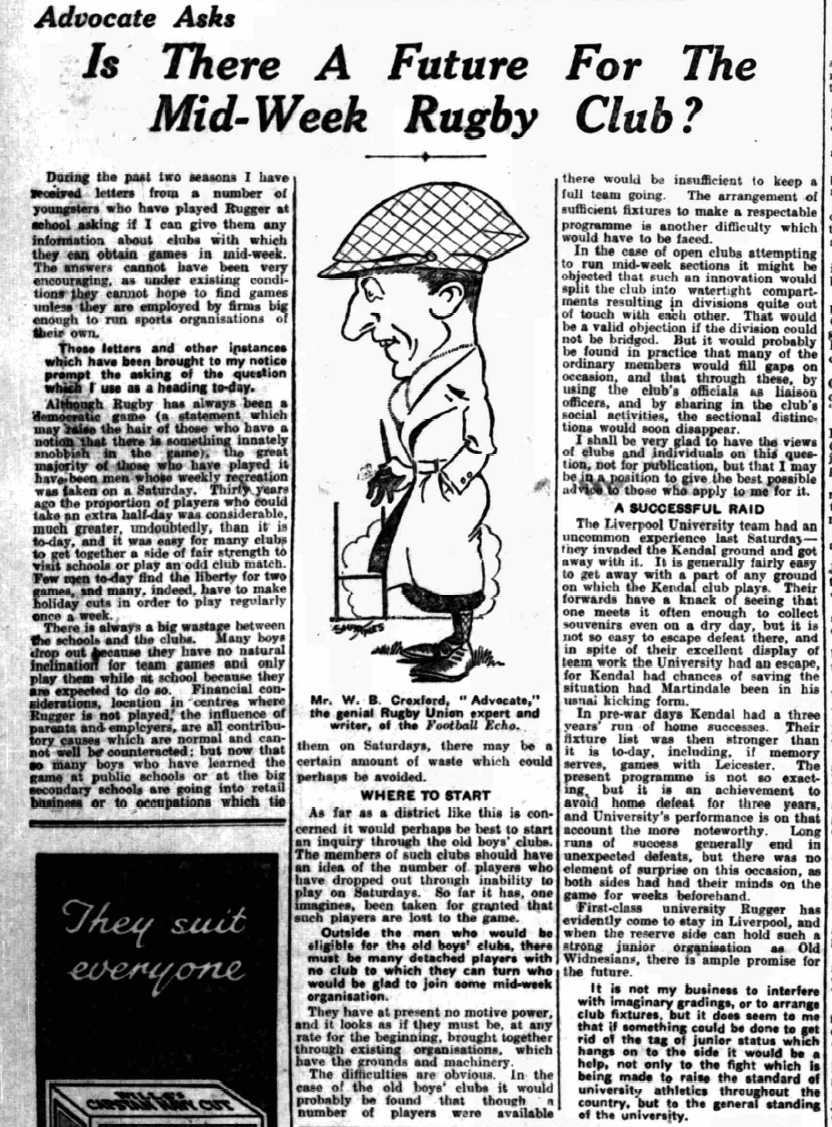
Liverpool Echo Jan 30th 1932

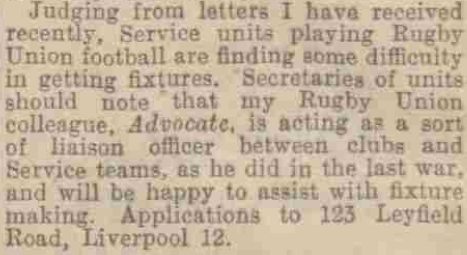
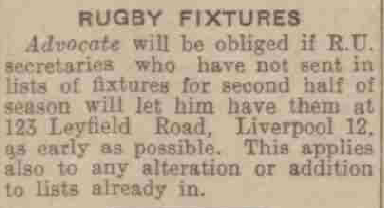
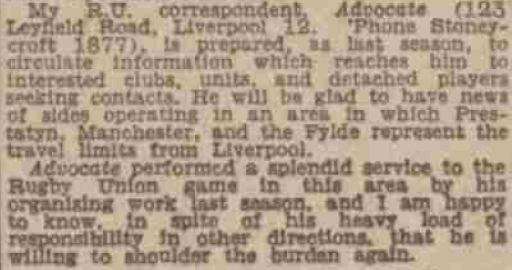
|
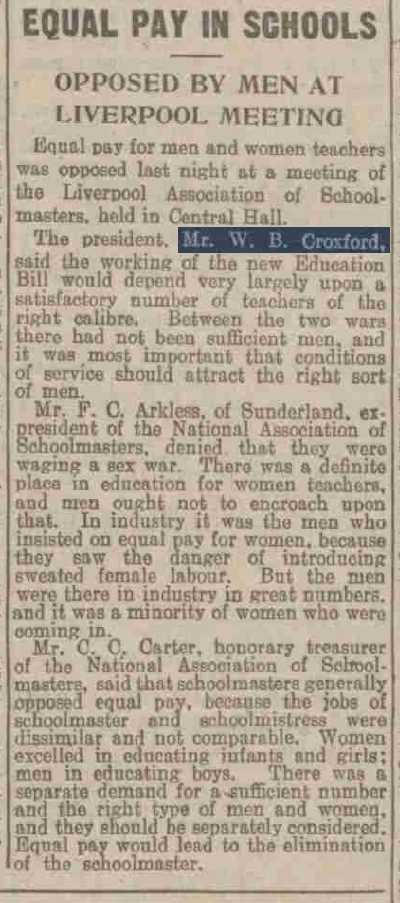
Liverpool Echo May 19th 1944
|
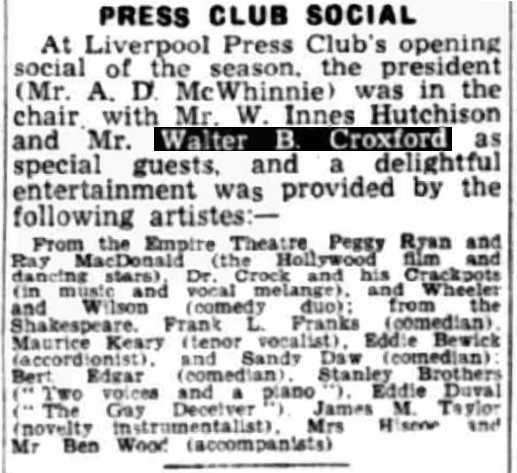
Liverpool Echo Oct 6th 1949
|
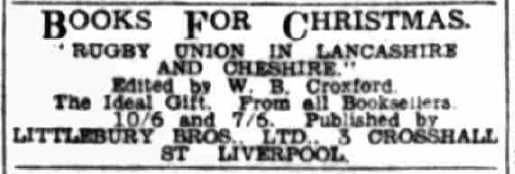
Rugby in Lancashire and Cheshire - Published 1950
Edited by W.B.Croxford
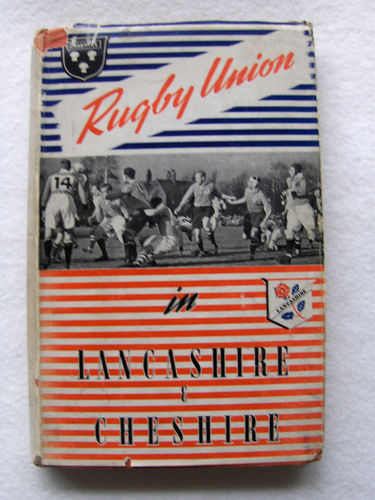
Published under the auspices of the Lancashire and Cheshire County Rugby Football Unions
by Littlebury Bros., 1950 - 127 pages
St Edward's School Magazine - Summer 1951
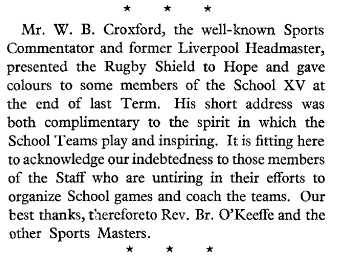
CROXFORD LAUDS LIVERPOOL RUGBY FOOTBALL CLUB
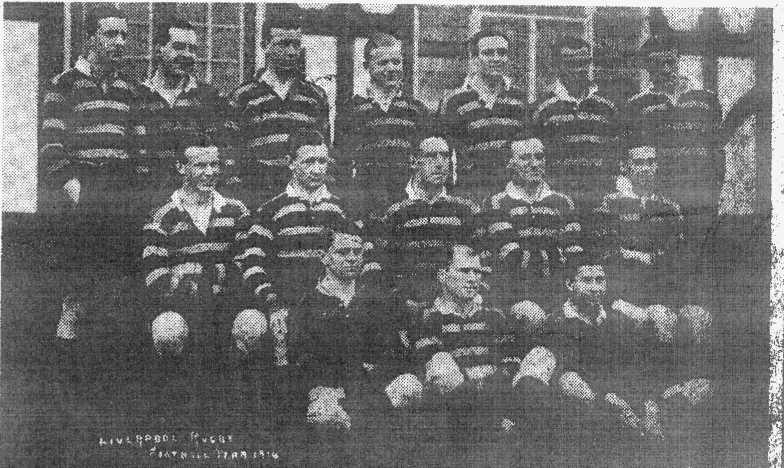
THE Liverpool Club began in the 1860’s, and among those responsible for putting the Club on a permanent basis were J.H.Clayton, J.T.Souter, J.R.Kewley and G.C.H.Dunlop. William Serjeantson was its first Captain, and the home matches in the Club’s early years were played on the ground of the Liverpool Cricket Club at Edge Hill. Opponents of the early ‘seventies were Manchester (our oldest opponents), Rochdale, Edinburgh Academicals, United Hospitals, Preston, Dingle, and Litherland. Birkenhead Park and New Brighton were played before 1880. J.H.Clayton, A.Lyon and Frank Tobin played for England against Scotland in 1871, in the days when the teams were twenty-a-side. Other Liverpool internationals of the ‘seventies were Edward Kewley, who played in five successive matches against Scotland, the Hon. S.Parker, C.W.H.Clarke, J.R.Hay-Gordon, C.L.Verelst, C.J.C.Touzell, H.H.Springman and H.D.Bateson.
The only new international of the 1880’s was A.T.Kemble. Some opponents met between 1880 and 1890 were Richmond, Bradford, Waterloo, Oxford University, Cambridge University, Manchester Free Wanderers, Liverpool Old Boys, Walton, Broughton Rangers, Rochdale Hornets, and Swinton. Mr. F.Marton-Hull was President from 1882 to 1894.
Before the close of the nineteenth century came first meetings with Blackheath, Moseley, Newport, Coventry, Sale, and Rugby School. During the ‘nineties G.G.Allen played for Ireland, and W.B.Stoddart and R.Pierce for England.
Between 1900 and 1914 the Liverpool Club had the services of many great players. R. H. Spooner, the famous cricketer, L.A.N.Slocock, G.Leather and R.W.Poulton-Palmer played for England, J.Strand-Jones for Wales, A.W.Angus and F.H.Turner for Scotland, and G.F.Allen, H.J.B.Knox, M.G.Garry and G.Pinion for Ireland. Dr. Beresford Knox is still a very active and popular Vice-President of the club for which he has done so much.
MEMBERS OF LIVERPOOL FIRST XV 1913/14
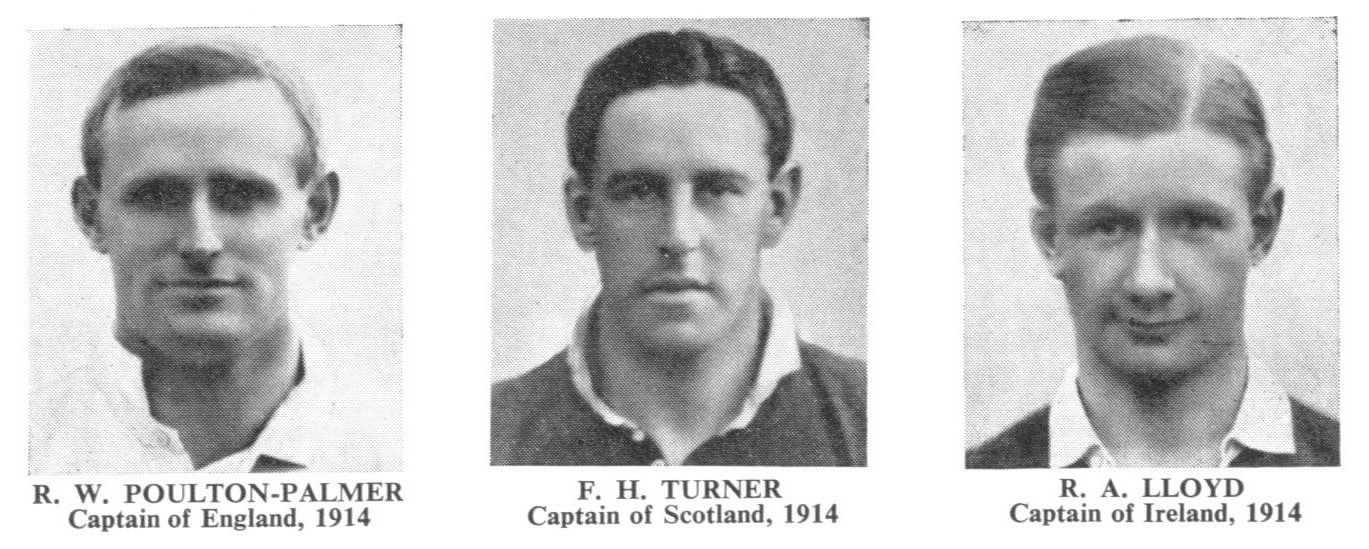
In 1903-04 C.E.Allen’s team won 18 matches, lost 5 and drew 1, and in 1906-07 G.Leather’s team won 17, lost 2 and drew 2 matches, but even these performances were overshadowed by those of the famous 1913-14 team, that won 27 matches and lost 4, scoring 838 points against 239. Mr. W. B. Croxford says in his Rugby Union in Lancashire and Cheshire: "Form rarely, if ever, equalled in club football was shown." This great team captained by F.H.Turner, included R.A.Lloyd and R.W.Poulton-Palmer, who like Turner, captained their countries in that season. The team, for part of the season, included other internationals in A.W.Angus and M.G.Garry, international trialists in T.G.Fowler (the Lancashire Captain of 1913-14) and J.E.Ross. G.B.Davey, another member of that famous team, played for both Lancashire and Cheshire, afterwards served the Club as President and as Honorary Secretary. Today the Club is very happy to have him as a very interested Vice-President.
In 1903, George Leather, who was to be the President from 1924 to 1928, commenced a period of no less than 44 years as Honorary Treasurer, a truly magnificent record of service which will always be remembered with deep appreciation.
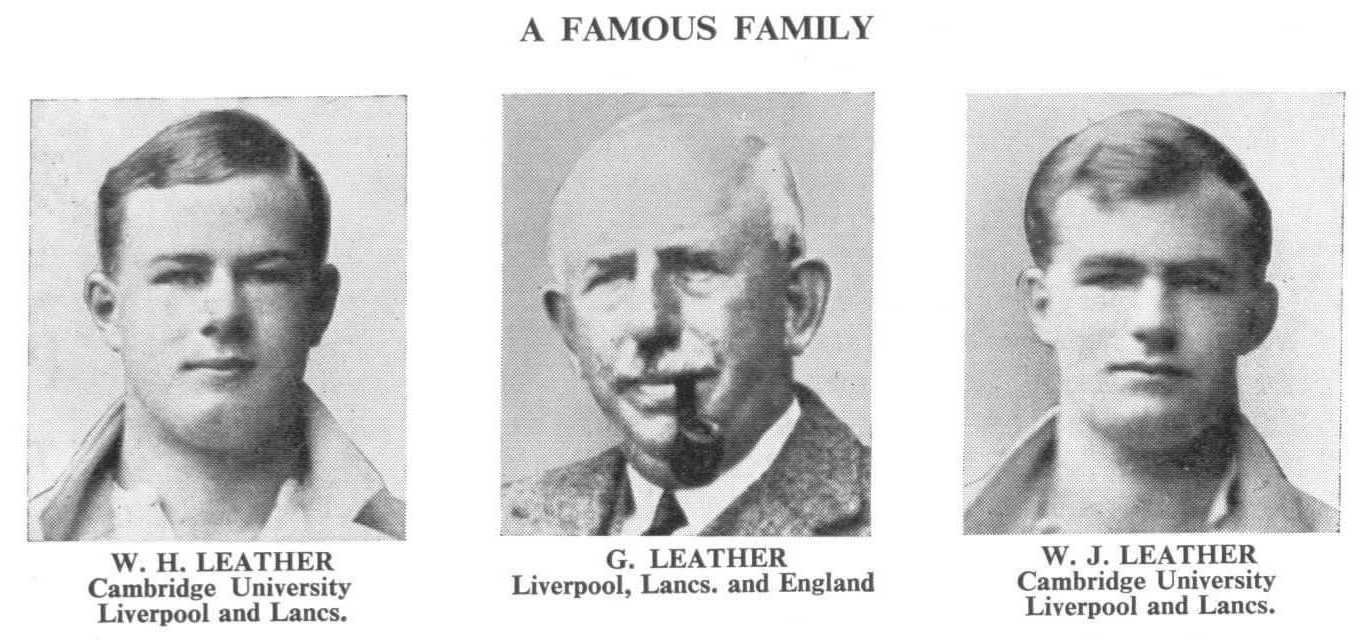
The First World War took a heavy toll on the Liverpool Club, no less than 57 members being among the fallen. These included F.H.Turner, R.W.Poulton-Palmer, L.A.N.Slocock, and the Honorary Secretary, C.H.Dunlop.
When the game was restarted after the war, with G.Birkett as Honorary Secretary and R.A.Lloyd as Captain, three teams were soon in action. With the help of players like H.W.B. Russell, G.A.Rutter and A.F.Blakiston, the Club soon recovered. During the period 1920-1930 Liverpool had two new internationals in A.F.Blakiston and F.J.Massey.
The period 193 1-1939 was the Club’s least successful period from the point of view of winning matches, but H.A.Fry gained three international caps in 1934, and University Blues were gained by W.H. and W.J.Leather.
After the Second World War a resumption could not be made until 1946, when the Club amalgamated with the Old Lerpoolian Club. Then the Club had two or three difficult years, but since the 1948-49 season the Club has had eight consecutive winnings seasons, the longest period of success in its history, and over the last three seasons out of 102 games played only 14 have been lost. The 1954-55 team, enthusiastically captained by David Boult, won 26, drew 5 and lost only 3 matches, and his 1955-56 team gained 24 wins, and had 4 losses and 4 draws, scoring 599 points. Last year’s team under Ray Lee, won 27 matches, a number of equalled only by the 1913-14 team.
In recent years many honours have come to the Liverpool Club. Martin Regan was capped twelve times for England and Reg. Higgins has gained the same number of English caps and has represented the British Isles in South Africa. Thanks to Reg’s pluck and ability he has already been capped four times after his serious accident in the British Touring Team’s first "Test Match" in South Africa, and we hope that he will establish a Club record by beating C. E.Allen’s 21 caps. The late J.K.Williams had an English trial and Ray Lee has had an Irish trial. Last April no less than seven of the first team played for Lancashire against the British Police.
The first team—as in 1857—play on a ground of the Liverpool Cricket Club, but a new ground will be available next year for the Junior teams, for the Club has been back to running five teams for some time now. For the building up of the Club after the war the Club owes much to its officers, particularly to its President N.D.I.Rycroft and its Honorary Treasurer, E.Wynn-Evans, and in no small measure to the post-war captains, J.G.Pugh, J.K.Jones, J.A.D.Fordyce, J.R.L.Martindale, D.L.Boult and R.Lee, for their work on and off the field.
"What a pageant of richly varied, swift, surprising movement Rugby would be if only more clubs realised the sheer intoxicating fun of it so obviously and consistently as do Liverpool. The fun in it for Liverpool may be described in a single word—attack."
Thus Denys Rowbotham of The Manchester Guardian wrote of Liverpool when reporting the Northern match last year. We deserved that compliment then—we trust we deserve it now. May we always deserve it.
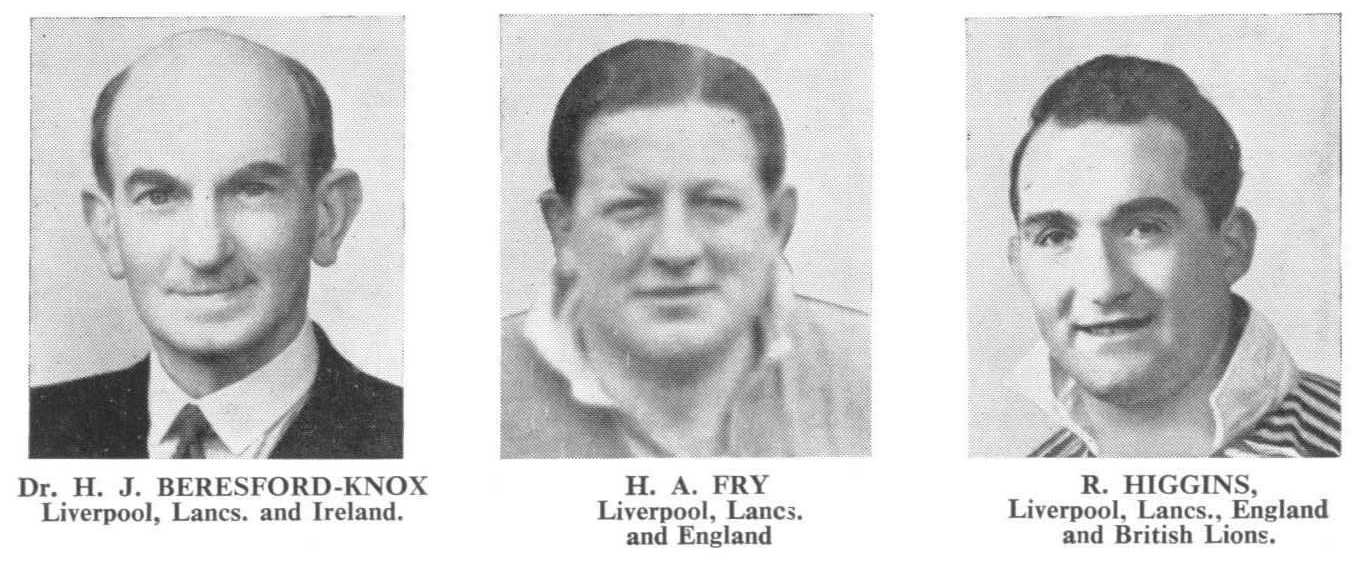
[Photos and narrative from The Centenary Match programme 21st December 1957]
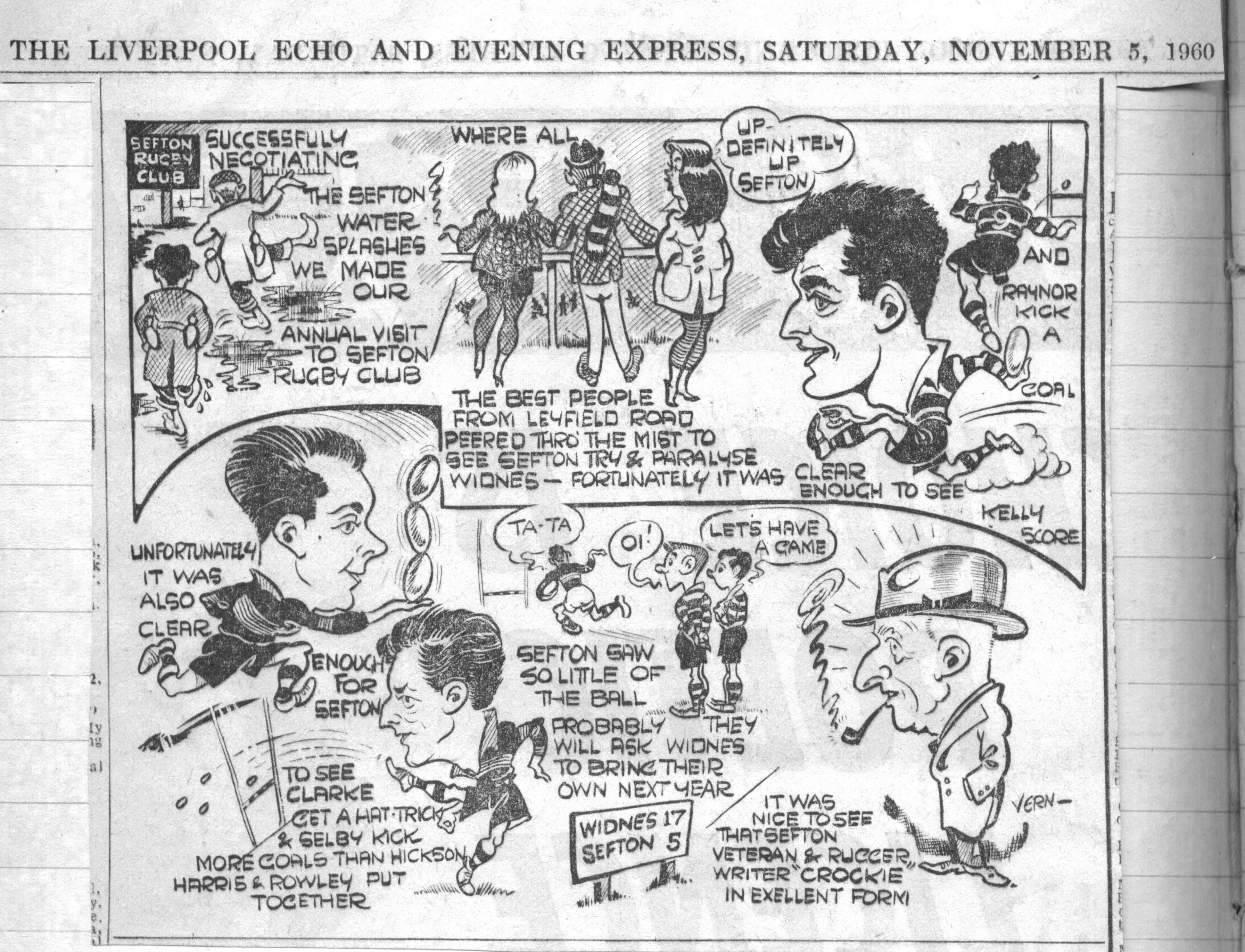
Vern Sharples was a brilliant sporting cartoonist for the Liverpool Echo and was always on the lookout for familiar faces in the crowd, this one in 1960 has picked out "Crockie" at a Sefton home game.
Liverpool Echo, 6th April, 1962
GOALPOSTS CHOPPED DOWN
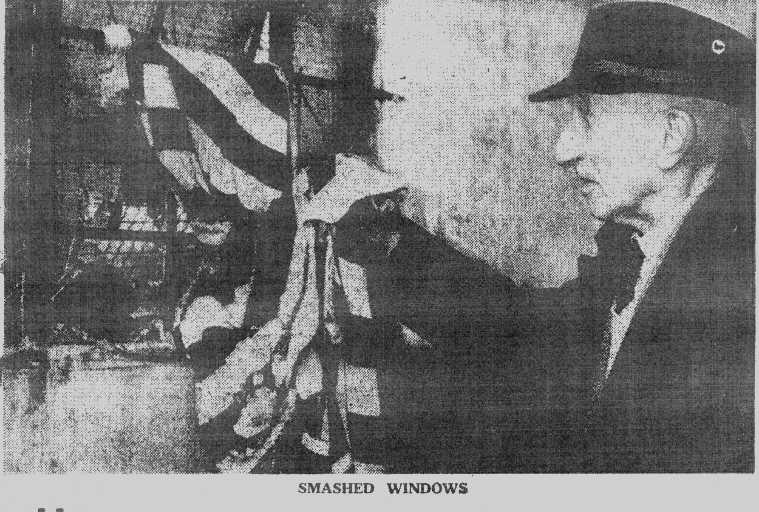
W.B.Croxford Surveys the Damage
Havoc at Sefton R.F.C ground
One of the worst reported cases of wanton vandalism occurred last Saturday, at the ground of Sefton R.U.F.C. When the groundsman arrived to prepare the pitches for the afternoon games, he found that both the posts at one end of the first team ground had been chopped off three feet above ground.
This could hardly have been the work of small boys, as the 40ft posts, deeply embedded in concrete, are strong and substantial. Rather did the cuts suggest a forester’s axe.
The cost of replacement, removing the old bed, and resetting may amount to £40, no small amount for a small amateur club already hard hit by pavilion break-ins, of which there have been three lately. Fences and walls have been damaged.
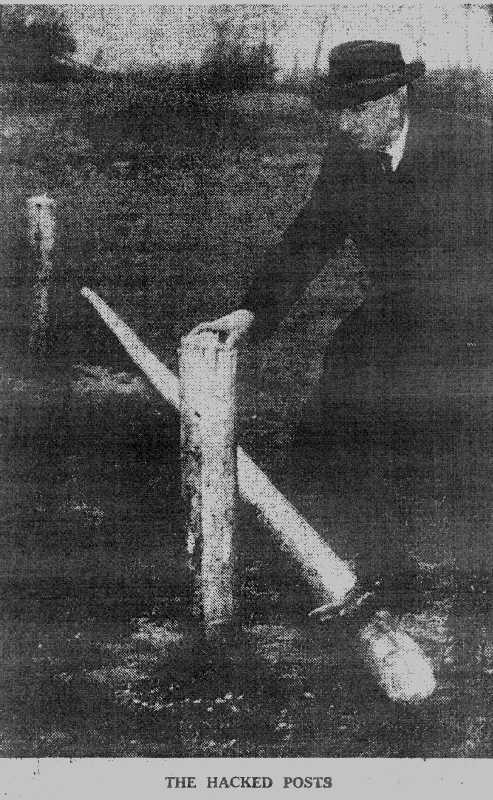
HELPS YOUNGSTERS
The irony of the wanton damage is that the club have given every possible encouragement to youngsters participating in the R.U game or wishing to do so. The ground has been loaned repeatedly for such events as County schoolboy trials, under-15 inter-city matches, and junior schoolboy sevens.
The annual match between the teams representing Liverpool and Birkenhead grammar schools is due to be played there a week today, the 13th, kick-off at 5 p.m.
Recently the club have been considering the running of a colts’ team, which would cater for the boys leaving school, until the time they were ready for inclusion in normal senior teams.
Senseless wrecking
Vandalism of the most senseless kind has been hitting Sefton Rugby Club at their West Derby headquarters.
Three times in the past months their pavilion has been broken into and subjected to wrecking, and on Saturday the first members to arrive at the club found that a set of the goalposts on the first team pitch had been chopped down about a yard above the ground.
To put up new posts as they are set in concrete and expensive in themselves - will be a considerable financial blow to the club. Such wrecking, which must be viciously premeditated, is poor reward indeed, for a club who have been in the vein of the movement for helping and encouraging youth in Rugby.
Sefton did, however, have one ray of light at the weekend. Their first team went away and beat Orrell 15-12 after trailing 13-8 at half time - only the second side to beat the doughty Orrell men (highly successful once more and conquerors of St Helens, too) at home this season.
Walter Bernard Croxford
(1883-1971)
Obituary
A Tribute to Mr Rugby Union - 23rd November 1971
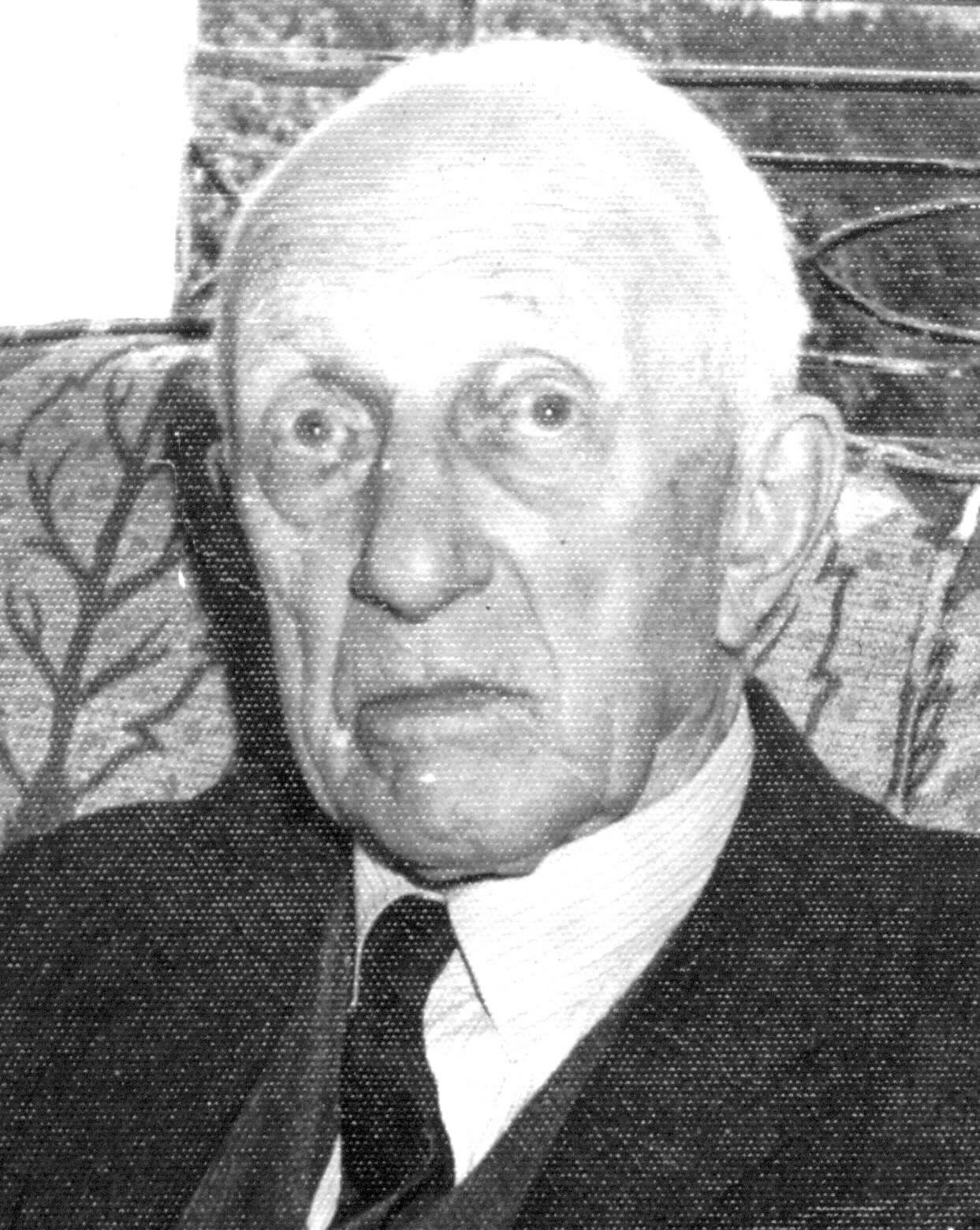
THE death occurred in Newsham General Hospital, Liverpool, yesterday of Mr W.B.Croxford, one of the best known figures in Merseyside Rugby Union for more than 50 years.
Mr Croxford wrote on Rugby for the Daily Post and Echo for 37 years, but he was also widely known as an administrator in the game and, in earlier years, as a player.
Mr Croxford, who was 88, won Lancashire County honours as wing three-quarter and was Club Captain of the Aliens Rugby Club (now Sefton RUFC) from 1911-14.
After his retirement as a player, he became a county selector and was chairman of Lancashire Schools' Selection Committee.
Mr Croxford, who lived at Lyndhurst, Leyfield Road, West Derby. Liverpool, was headmaster of Barlows Lane County School, Aintree, until his retirement.
On Saturday Sefton, who are at home to Wrexham, will observe a minute's silence before the kick-off in tribute to Mr Croxford.
Tribute
Harry Fry, a former England international and Past President of Lancashire rugby writes: W.B. Croxford was one of the great men of Lancashire rugby. Educated and trained in the game at Denstone, he played for Lancashire as a wing three-quarter before the First World War.
I knew him first when I was an up and coming fly-half or centre three-quarter at Liverpool College and he advised me - wise man as he was - to go back to my original position as a wing forward - advice which paid me handsomely.
He was a great student of the game, particularly with regard to schoolboys, for whom he did tremendous work. He was always at hand to bring to the notice of the county selection committee any young player's who showed promise
Appendix
W.B.Croxford made damn sure it wasn't !
RUGBY FOOTBALL.
PROPOSED DISTRICT LEAGUE.
The unmistakable decline of the rugby game during the past few years in this district has this season been more pronounced than ever, causing many well-wishers of the game considerable anxiety as to its future. With a view of resuscitating interest in the handling code, a correspondent offers the following suggestions, which certainly are worthy of careful and deliberate consideration:- "No one who has welfare of the Rugby game at heart can have been anything else but pained to note the gradual, but sure, decline of interest in the game in this district during the past five years.
Probably the loss of our local clubs of their most attractive fixtures, owing to the defection of the large number of first-class clubs that have gone over to the Northern Union, has had much to do with this lamentable fact; but, whatever may be the reason, there is no doubt that unless something is done to revive the drooping, and on this side of the Mersey, well-nigh dead interest in the game, the Rugby code in Liverpool and district will in a few years be as extinct as a dodo. As an example of the low ebb to which public interest in the game has sunk, I may mention that one of our first-class clubs took a total gate-money for the entire past season of twelve home matches less than £6, an average of about 10s. per match ! and it is certain that if our leading clubs in Liverpool were not so loyally supported in financial way by their playing and non-playing members they would be unable to carry on at all. Under these circumstances, it is not surprising that the apathy and indifference displayed by the sport-loving public has spread to the players, and not only is it becoming increasingly difficult to get men to keep themselves in the condition and training necessary for the highest development of the game, but even to raise teams sometimes has become an extremely arduous task. Such, then, is the state of affairs at present existing, and it behoves those who wish well to the game to find an adequate remedy for it. Such a remedy would, I feel convinced, be found in an adoption of the league system, and I would like to invite correspondence through the medium of your valued paper on the following proposition:- Of the advantages of a league it is not necessary for me to write, as the success of those in connection with the Northern Union in the Rugby world, and of those in connection with the association game, is a sufficient object-lesson of the utility of such a system in vastly increasing the interest not only of the general public, but also of the players. This would be specially the case in this district, where we are free from any taint of psuedo-amateurism, and I feel assured that were such a competition initiated the beneficial effects would be immediately apparent in greatly increased interest on the part of spectators, and renewed enthusiasm on the part of players. My proposition, which of course is merely a tentative one, and which would probably require to be modified or extended as circumstances demanded, is as follows:- The formation of a Manchester and Liverpool District Rugby Union League, and I would suggest the following clubs as members:-
Manchester: Broughton, Sale, Free Wanderers, Broughton Park.
Liverpool: Liverpool, Old Boys, Waterloo, Birkenhead Park, Birkenhead Wanderers.
The League would be governed by a committee consisting of one representative from each club in it, and probably, this need not necessarily be part of the scheme, a cup and medals would be presented to the winning team. Should it not be found possible to include he Manchester clubs in such a competition, a very good League could be formed in Liverpool and district alone, which then could include some of the rising junior teams of the district; but if at all feasible, the former scheme would be much preferable, as it would cause a much greater and more widely spread interest, and would prevent any unnecessary keenness and friction which might occur in a purely local League. If anything is to be done on these lines during next season, it is necessary that steps should be taken as soon possible, so I hope that those who favour the formation of such a League will communicate their views without delay."
Liverpool Mercury, Monday 3rd May 1897
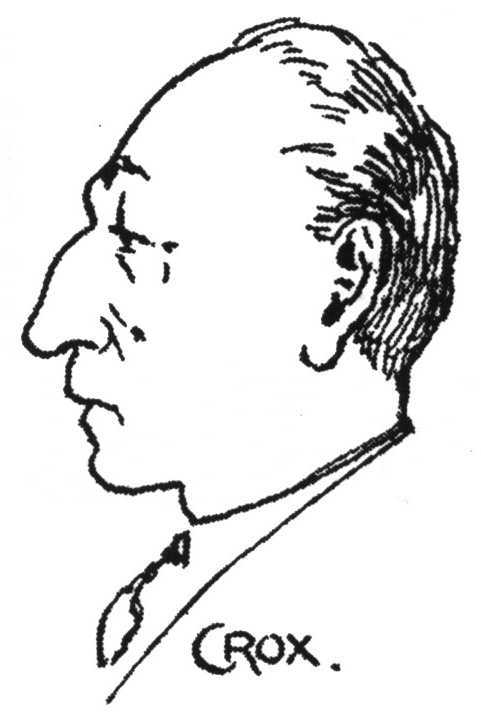
All Aliens RFC, Sefton RUFC photographs, programmes and memorabilia Copyright © 2012 Sefton RUFC